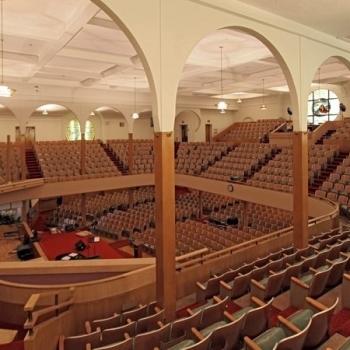I am attending the young clergy leadership forum (#yclf on twitter) with the General Board of Church and Society (GBCS) in Washington, DC. This is the agency that lobbies the federal government on behalf of the United Methodist Church according to the agenda set forth every four years by our General Conference. I decided I would blog about my experience in a series called “Jesus inside the beltway.” The first question it seems important to ask is why they exist.
There is a common narrative in the Methodist blogosphere that Methodism is in decline because we’re riddled with top-heavy bureaucracy and that all these wasteful, “out of touch” general agencies should get cut so we can focus all our resources on the local church. It’s an echo of the libertarian ethos that predominates popular discourse about “government spending.” How can anything relevant happen on a macroscopic level disconnected from my grassroots reality? We live in a technocracy in which we expect most of our world to be the product of arbitrary, impersonal socioeconomic forces there’s no point in trying to engage. It seems most reasonable to try to build the kingdom of God within our small sphere of influence and hope and trust that others will do the same elsewhere.
“So why are you here?” This was the question a congressional office receptionist asked a former corporate lobbyist who started working for GBCS. Previously when he had gone from office to office on behalf of Exxon-Mobil, he was given VIP treatment: “Please come right this way. The senator would love to talk to you.” But when he said he was there on behalf of a church, it made the congressional staffers scratch their heads.
The assumption is that if you lobby a congressperson or senator, you’re doing so on behalf of somebody’s special interest in order to get the best out of one of the ten thousand clauses and exemptions that makes every law the size of a telephone book. There are times when churches have special interests, in terms of getting tax breaks, or most recently, exceptions to health care law, but GBCS doesn’t really lobby for Methodists to get special treatment. It rather seeks to faithfully represent the policy positions established every four years at General Conference.
A lot of times when spokespeople from GBCS give a press conference and Methodists in the heartland hear about it, they get offended that someone is misrepresenting their views. But they are just articulating what our representatives have decided as a body at our annual conferences and General Conferences. I feel embarrassed to have to confess this, but I have been one of the grumbly people who gets aggravated and impatient sitting through all those dadgum resolutions that come before our annual conference: “Why are we talking about government policy on water privatization? What’s that got to do with making disciples?” I wonder how many people leave the room like I sometimes have to browse for books or socialize when these conversations are going on. What you’re not allowed to do is leave the room and then complain that you’re misrepresented.
Now let’s look at the hypothetical water privatization question from the vantage point of Capitol Hill. Should the bottled water companies be the only voices our government hears if they want permission to siphon off water from a lake for profit and jeopardize the local ecosystem? Should the only alternative perspective come from a dread-lock wearing hippie making an argument from a secular perspective? Should it matter that the Bible says, “The Earth is the Lord’s and everything in it”? Should someone be going around to the congresspeople who are Christian or even Methodist to tell them to read Psalm 24:1 and meditate on it before making their decision?
To some people, even engaging the government at all as the church is already wrong. I do think that we need to be aloof to any kind of partisan entanglement but that’s for the sake of our prophetic integrity. If we really believe that Biblical truth provides the basis for creating a just humanity, then why shouldn’t we be proclaiming these truths in the halls of Caesar? Does this mean that we should demonize other Christians who come to different conclusions starting from the same truths? By no means. Nor does it mean that we should engage in character assassination of political figured from our pulpits, though we are responsible for naming uncomfortable truths in our preaching since a critical part of our discipleship involves being liberated from the worldly presumptions of our privilege.
Does this mean that we should lobby government on behalf of the poor instead of engaging in ministry with the poor? This only becomes an either/or dichotomy if our direct ministry with the poor is invested in something other than their well-being. Are we working in soup kitchens for the sake of self-justifying photo ops and to validate our worldview that there shouldn’t be food stamps and other government programs? Of course, you can also engage in advocacy work for self-justifying reasons rather than out of true solidarity with the people you’re supposedly supporting. I’ve done that.
I thought I would close with a quote from Tony Campolo: “The thing I love about you United Methodists is you work on behalf of people who will never go to your churches even if it pisses off the people who do.” Jesus healed a lot of people who never became disciples and He pissed off a lot of Pharisees who got offended by it. So let’s make disciples to transform the world; don’t hate what isn’t in your grassroots field of vision; and stay in the room when those resolutions are getting discussed at annual conference.











